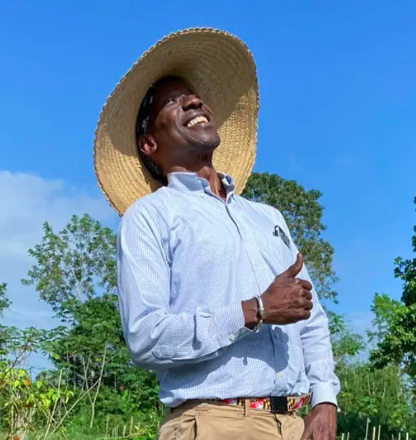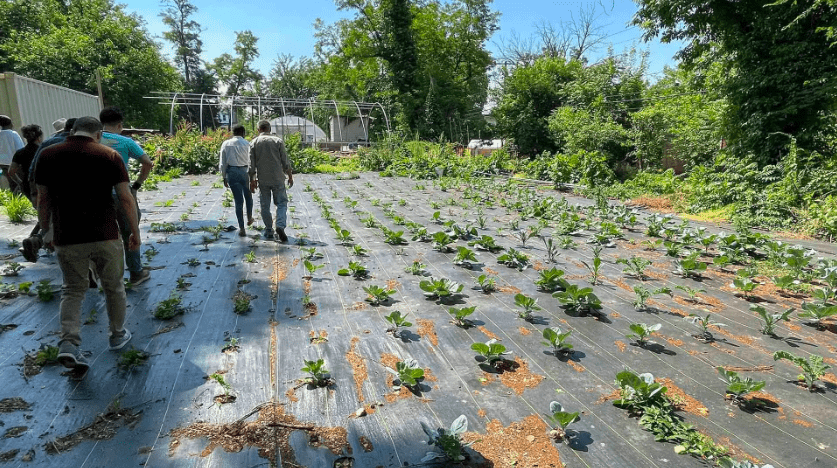Originally appeared in Maryland Today, written by Allison Eatough ’97 Oct 11, 2023
At the Plantation Park Heights Urban Farm in Baltimore, watering the end-of-season tomatoes, kale and Brussels sprouts takes more than just a turn of a spigot.
It involves prying up a manhole cover on a nearby sidewalk and running two 100-foot hoses from the city’s public water system into rows of vegetables that rarely get enough hydration from rain alone.
From April through October, this is the daily routine for founder Richard Francis, better known as “Farmer Chippy,” a former biomedical field service engineer who set up the farm to help residents of the Park Heights neighborhood grow their own food on abandoned city-owned lots.
“Setup and breakdown takes 15 minutes,” he said. “The watering takes two hours. And I have to constantly monitor to make sure there are no leaks.”
A new project spearheaded by environmental health Assistant Professor Rachel Rosenberg Goldstein and colleagues from UMD’s Environmental Finance Center (EFC), University of Maryland Extension (UME) and U.S. Department of Agriculture (USDA) Agricultural Research Services will help urban farmers like Francis harvest and filter rainwater to nourish their crops and eventually create more sustainable farms and resilient communities.
Funded by a $300,000 USDA grant, the project aims to solve a growing challenge for urban farmers nationwide: the availability and cost of city water.
“Most urban farmers rely on municipal water for irrigation, which depends on proximity to existing water mains and can be expensive, unreliable or dependent on a city’s capacity for maintenance,” said Goldstein, a water quality specialist.
In a recent survey led by Goldstein and her colleagues, 100% of the 38 Baltimore farmers and community gardeners they contacted reported having access to city-supplied water, but more than half said they had trouble managing and supplying the water to their farms. Issues included long waits for repairs, limited availability by season and frequent leaks.
Francis (pictured at right) pays Baltimore about $500 for water access during the growing season, and should it rain sufficiently, also collects rainwater that falls from the hoop-style greenhouses on site.
But even if a downpour fills the tanks, he worries about the water’s quality and the growing strain on the planet’s water resources. Rainwater can carry bacteria, parasites and viruses.
In year one of the two-year project, Goldstein and her research team work with managers from Terp Farm on the University of Maryland’s Upper Marlboro facility to design a rainwater harvesting system that incorporates different treatment methods, including an affordable, gravity-fed sand filter that uses recycled iron shavings.
“These rainwater harvesting systems will incorporate sustainable water treatments that have only ever been lab-tested,” Goldstein said. “Because the harvested rainwater will be used for agricultural irrigation, we are also working with larger volumes than a typical rain barrel used at a residential home.”
Researchers will also test the harvested rainwater to confirm that it meets food safety standards.
The following year, they will use what they’ve learned to build another rainwater harvesting system with test plots at the Park Heights farm, drawing water from existing and new hoop houses. Neith Little, UME urban agriculture educator for Baltimore, and Amanda Rockler, a regional watershed restoration specialist with UME, will lead the outreach with urban farmers. Jennifer Egan, EFC program manager, will evaluate the environmental, social and economic benefits of the harvested rainwater system for irrigation in underserved urban communities.
“Along with developing these systems, we hope to educate more farmers about the benefits of rainwater harvesting both on and off the farm,” Goldstein said. “More water can lead to increased crop yields. As a result, we might be able to reduce food insecurity in the underserved communities that urban farms often serve.”
Construction has already started at Terp Farm, and work is expected to begin at the Park Heights farm in fall 2024.
“We want to climate-proof our farm and make it more sustainable,” Francis added. “The work (Goldstein) and the university is doing will give us full autonomy.”

